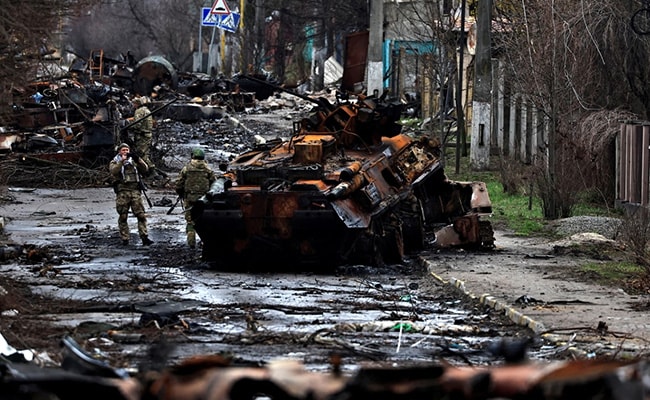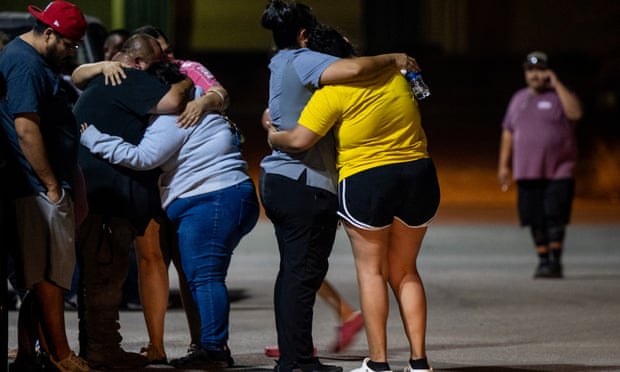
American Wars*
Valeriy Andrianov, an associate professor at Financial University under the government of the Russian Federation, and a political analyst, on the everlasting tendency of the U.S. elite to instigate international provocations.
The Western media, in perfect unison, justify abandoning a diplomatic settlement in Ukraine because of the “barbaric Bucha massacre.” However, the very fact that this event was a classic false flag operation, in which both the British and the U.S. intelligence services participated, is no longer in any doubt. The video, showing carefully placed bodies on the streets of the town, emerged four days after Russian forces left Bucha. When the holes in this plot began to become apparent (like a “body” in a rearview mirror standing up), the Kyiv “producers” themselves tried to remove this video from social media, frightened by their own clumsiness. Then, a weeping (but laughing off-screen) Volodymyr Zelenskyy appeared before the cameras, followed by the outrage of the Western audience (mark the dramatic similarity between the town name Bucha and the English word “butcher,” clearly intended for Westerners). This theatrical performance takes us back to the recent Syrian crisis.
It was a simple two-move combination: first it was announced that a chemical attack was a “red line” that Bashar Assad's regime should not cross under any circumstances. Then someone used a poisonous gas in Ghouta, resulting in more than 1,000 people dead. In just an hour, all the world’s media were abuzz with the news about the “horrific crime of Assad” — who was well aware that the West was looking for an excuse to start an invasion, and who wouldn’t possibly want to expose himself like that. The journalists were reporting right from the scene, perhaps oblivious to the fact that poisonous gases don’t dissipate so quickly. All in all, the Syrian “business,” just like the false flag operation at Bucha, was a typical U.S. artificially fabricated casus belli. Let’s recall the once famous story of the explosion aboard the USS Maine in 1898.
“Treacherous Spaniards blew up our ship. This is a reason for war,” wrote the New York World newspaper back then.** The armored cruiser Maine, stationed off the coast of Cuba (which at the time was a Spanish colony), got blown to pieces. Two hundred sixty-six people died in the process (mostly enlisted sailors and Marines, since some of the officers were on shore and some in their quarters in the aft portion of the ship, curiously spared by the explosion). A real storm swept up American society. The entire country was singing the patriotic song “Remember the Maine.” As a result, the U.S. president at the time, William McKinley, declared war against the Spanish Empire.
When in 1910 the USS Maine was raised, it became clear that there were no mine holes in its hull. That means that the explosion happened for internal reasons. And here’s an interesting fact: several days before the explosion, reporter Frederic Remington sent a telegram from Cuba to William Hearst, a media mogul and the owner of the New York Journal. “Everything is quiet. There is no trouble here. There will be no war. I wish to return,” Remington said. “Please remain. You furnish the pictures, and I’ll furnish the war,” an immediate reply followed. And then the war, in which Cuba and the Philippines became U.S. protectorates, really started.
Moreover, historians do not rule out the possibility that the attack on Pearl Harbor was ultimately the result of an American provocation. “President [Franklin D.] Roosevelt provoked the attack on Pearl Harbor,” noted American writer Gore Vidal. “By imposing an economic blockade and demonstratively keeping in contact with the Japanese adversaries, he strengthened the war party in Tokyo and practically forced the Japanese to strike a U.S. military base.”** And the Gulf of Tonkin incident in August 1964, when a U.S. destroyer was attacked by unidentified torpedo boats, led to the escalation of a bloody war, with a death toll of 3 million Vietnamese.
There’s little doubt now that fabricated claims were the reason the U.S. and NATO intervened in the Balkan wars of the 1990s. In 1992 the West planned to impose sanctions against Serbia and Montenegro. They only had to find an excuse. And then, by a strange coincidence, an explosion happened on May 30 on Vase Miskina Street in Sarajevo***; the cameras were close by, and everything was already prepared — the victims were filmed, blood flowed like a river, and the investigation materials landed on the desks of the officials at the U.N. Security Council session, fresh out of the oven. As a result, the members of the council made the unanimous decision that the West needed.
And here’s what preceded Operation Deliberate Force, conducted by NATO and aimed against Bosnian Serbs who had besieged Sarajevo. “There were two explosions that were identical in their circumstances at the Markale markets in 1994 and 1995,” said Elena Guskova, the head of the Center for Contemporary Balkan Crisis of the Institute for Slavic Studies of the Russian Academy of Sciences. “After the first explosion, NATO began bombing Serbian positions, and the world community took it well, no one protested. Then, in 1995, they even decided to follow the same narrative — tragedy struck on the same market, Bosnian Serbs were yet again declared responsible for the explosion and NATO forces launched a large-scale two-week bombardment of their positions.” In that second case, however, Russian peacekeeping forces Colonel Andrei Demurenko threw a wrench into NATO's works when he spoke to Western reporters and proved that the Serbians were not responsible for the explosion.
The justification for the bombings of Serbia in 1999 was, as we know, the staging of the massacre in the village of Račak. The Western media were aghast at the “vicious murder” of civilians, sanctioned by the “bloody regime of Slobodan Milošević.” But as time passed, it became obvious that this was a carefully planned provocation. “All historians know well, and many books were written about it, that no civilians were killed in Račak,” Guskova said. “Bodies of Albanian militants were brought to the village, dressed as civilians and put on the roads.” A group of Finnish medical examiners came, for instance, to such a conclusion when examining the remains of civilians shot in Račak. Traces of gunpowder were found on their fingers, there were bullet holes in their bodies but not in their clothes. Apparently, they fell in battle, not by a shot in the head from a short distance as the Western media reported.
Many experts are convinced that the events of 9/11 that became the justification for the U.S. invasion of Afghanistan were a grand provocation. The U.S. administration either orchestrated it themselves or allowed their pet al-Qaida terrorists to do it, nurtured by the U.S. back in the 1980s. George W. Bush’s team, perhaps, did not organize the terrorist attack by themselves, but they were well aware of the preparation of such an attack, and the idea of preventing this tragedy didn’t even cross their minds. Why? Well, because it allowed American neoconservatives to put their grand plan of remodeling the Middle East into action.
Finally, the justification to start a war in Iraq was a fabricated claim that Saddam Hussein possessed weapons of mass destruction. Let’s remember then-Secretary of State Colin Powell waving around a vial with a poisonous substance during a U.N. session.
As such, there’s nothing new in the modern Ukrainian drama. In this case, however, the Americans should have covered their tracks and prevented the leak of information about an extensive network of laboratories where, under the protection of the Pentagon and with Hunter Biden’s money (the son of the current U.S. president), biological weapons were created and experiments on humans were conducted. For that, Washington practically decided to become a side in this conflict, struggling to turn Ukraine into a new Afghanistan and producing false accusations against the Russian army.
**Editor's Note: This quotation, though accurately translated, could not be verified.
***Translator's Note: The Vase Miskina explosion took place on May 27, 1992, not May 30.

